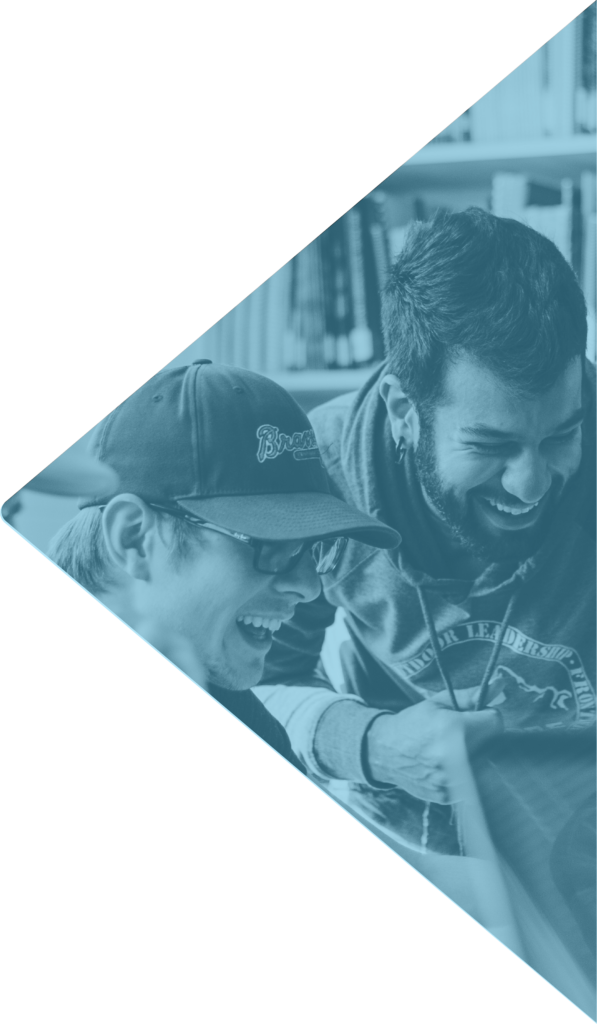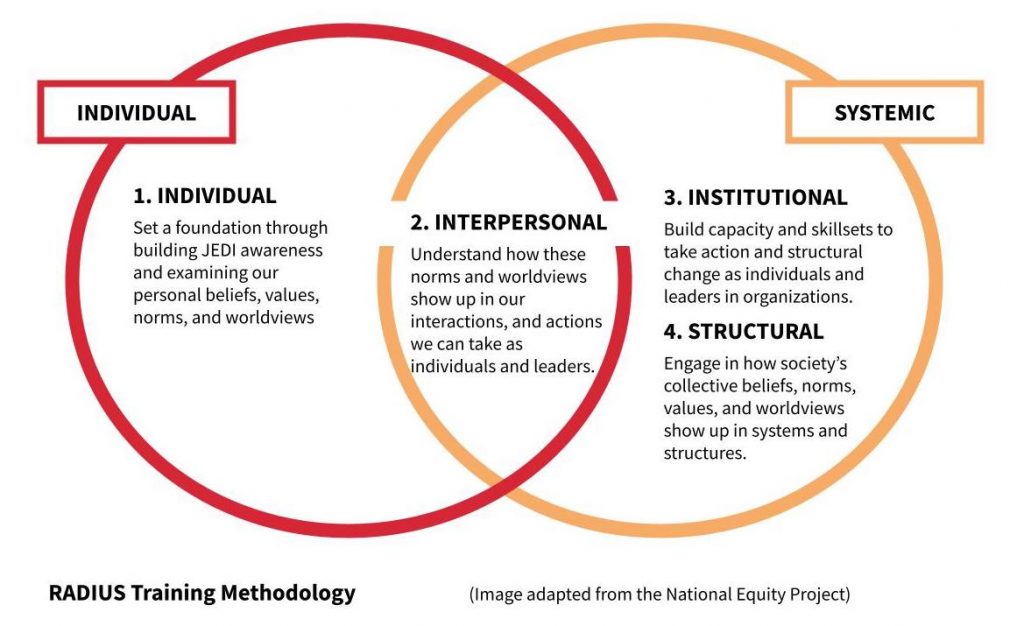
Equity-Centred Learning & Development
RADIUS offers training in Justice, Equity, Diversity, and Inclusion (JEDI) and their applications as individuals and leaders in organizations.
This training is delivered through online, self-paced learning modules composed of audio, videos, case studies, and personal reflection questions. We accompany these modules with required facilitated group reflection sessions to collectively explore, critically reflect, and further internalize the content to deepen individual learning and application. We also offer customized training plans and approaches.
Objectives
RADIUS’ JEDI training helps to learn, unlearn, discuss, and apply concepts of systemic racism, power, and oppression in practical ways within our daily lives, interactions, and workplaces.
We know we are all along our own journeys, from those with decades of lived experiences and expertise to those discovering the far-reaching, long-standing impacts of racism; through practice and support, we will explore and discuss them more openly, safely, and in greater depth alongside you and your teams.
This training seeks to grow the awareness, accountability, and capacity to take action against beliefs and norms perpetuating – inadvertently or not – inequities.
Through these modules and reflection sessions, we aim to:
- Clarify and deepen understanding of JEDI principles and their importance;
- Grow critical analysis skills to link and apply JEDI to personal and professional roles;
- Provide opportunities and safe and accountable spaces to learn, unlearn, and apply;
- Equip and empower with tools to take actionable and accountable steps for systems change.
Interested or want to learn more?
Contact RADIUS’ Consulting and Training Team at consulting@radiussfu.com
Framework & Methodology
Our training follows the Deep Equity and Systems Change framework (Sheryl Petty and Mark Leach, 2020) which focuses on combating inequities at the individual, interpersonal, institutional, and systemic levels (illustrated below). It equips learners to take a combined systems and intersectional lens to examine and take action against forms of oppression and systemic inequities.

Module Descriptions
The following modules can be selected individually or taken collectively as a progression and package, culminating from setting the foundation individually, taking action in our interactions and leadership, to creating change within the structures in which we work and live.
Introduction
Pre-Module Facilitated Session | Introduction to JEDI Training (1 hour)
This facilitated introductory session introduces learning objectives and expectations, sets the foundation for a safe, relational, and accountable environment, and allows participants to reflect on their own personal learning objectives and commitments prior to module content.
Learning Objectives:
- Build relationships among participants and the facilitation team
- Understand the objectives and progression of the JEDI training modules
- Create community agreements for accountable conversations and exploration
- Build capacity for learning and growth around JEDI topics
Individual Level
Module 1 | An Individual Lens and Systems View of Justice, Equity, Diversity, & Inclusion (3-6 hours)
For many organizations, diversity seems to be the common first misstep towards creating equitable and inclusive organizations. To cultivate a culture that truly embraces diversity, what conditions are needed to sustain it in our society and workplaces?
In this primer, learners are introduced to a quintessential glossary of JEDI, which will create an enriched starting point before participating in future modules and deeper discussions and applications on anti-racism and inequities.
We explore the differences between equality and equity and the intersections of justice, equity, diversity, and inclusion and begin to understand diversity is not a starting point yet is an outcome of consistent and intentional practices centred on equity, accountability, and inclusion.
Learning Objectives:
- Understand and unpack key terms and concepts like justice, equity, diversity, inclusion, prejudice, discrimination, and bias, and the case for rooting this work in justice
- Understand the key conditions and leadership qualities that can foster and sustain a diverse and inclusive culture and workforce
- Build foundational, individual awareness and capacity to view and analyze using a systems lens
- Apply terms and tools to analysis and case study on Developing our JEDI Lens at Individual, Interpersonal, and Institutional Levels
Module 2 | Foundations of Anti-Racism (4-7 hours)
What is racism? How can we meaningfully understand the deeply-rooted impacts it has on our society, culture, workplaces, and relationships? How can we begin to pave the way toward an anti-racist world?
In this module, learners develop a systems thinking lens and apply it to a historical exploration of racism and colonialism and their ongoing impacts today.
Learners are introduced to frameworks that support critical thinking and recognizing and taking action on systemic racism in their daily lives.
Learning Objectives:
- Deepen individual awareness and capacity to view and analyze using JEDI, systems, and anti-racist lenses
- Understand how history shapes the beliefs, worldviews, and the oppressive systems we live in, which continue to marginalize and exclude Indigenous, Black, and people of colour
- Understand and unpack terms like racism, White supremacy, ‘reverse racism’, and anti-racism from an individual to a system-level lens
- Apply concepts and framework to case study on The Indian Act and Financial Services
Facilitated Session | Group Reflection: Modules 1 & 2 (half-day)
This session aligns and deepens learning about JEDI concepts and anti-racism to build individual awareness, grow perspective, and begin applying learnings both personally and professionally.
Learning Objectives:
- Clarify terms and concepts, including terms like diversity and white supremacy
- Reflect and unpack key learnings and takeaways from the modules
- Apply concepts to individual reflection and action using frameworks and tools like the social location wheel and personal action plan
Interpersonal Level
Module 3 | Mapping Ourselves & Allyship (4-7 hours)
We are all agents of change. However, how we move through the world – our access to resources, opportunities, and power – are influenced by the intersecting and fluid identities we hold. This concept, introduced by Kimberlé Crenshaw, is called intersectionality.
Through understanding power and our relationship to power and privilege, learners explore their distinct and unique avenues to empower, advocate, lead, and (re)distribute power.
Learning Objectives:
- Define the expressions and faces of power impacting personal and professional roles
- Explore the concepts of intersectionality, allyship, and accountability and how they shape the unique ways we can activate change and ensure true inclusion in our workplaces
- Apply concepts to case study on Power and Allyship in the Workplace
Module 4 | Accountability & Conflict Engagement (4-7 hours)
In a complex and diverse world, conflict is unavoidable. Our biases and beliefs, and how they translate through our words and actions, can harm others, even if unintended.
In this module, we emphasize the importance of accountability and conflict engagement to prevent and address harm and to restore and repair trust. When individuals and leaders are equipped with the necessary skills and tools to transform misunderstandings and disputes into opportunities for growth and trust-building, we personally and organizationally benefit through deeper learning, strengthened relationships, and more vibrant, inclusive cultures.
Learning Objectives:
- Introduce types of microaggressions, their impact on well-being, and frameworks to interrupt them
- Understand conflict, such as triggers, relational dynamics, diagnosing its roots, and restorative practices
- Describe notable types of conflict through a systems thinking lens
- Understand the role power plays in conflict
- Learn tools/frameworks to effectively respond to and engage with harmful interactions and conflict
- Apply concepts and frameworks to case study on Practicing Accountability in the Workplace
Facilitated Session | Group Reflection: Modules 3 & 4 (half-day)
This session further equips learners with the awareness, analytical lens, and ability to take personal and professional action in interactions, situations, and decisions that impact and involve others.
Learning Objectives:
- Clarify terms and concepts, including terms like allyship, power, intersectionality, accountability, and microaggressions
- Reflect and unpack key learnings and takeaways from the modules
- Apply concepts to individual reflection and action using guiding principles and considerations for being an ally, calling in/calling out, and repairing harm from microaggressions
Institutional & Structural Levels
Module 5 | Culture & Leadership Practices (4-7 hours)
Before diversity, we must establish equitable practices and inclusive and accountable cultures to support it. To create a culture where employees can thrive, a sense of safety and dignity are paramount. In this module, learners examine how our existing workplace norms and expectations restrict the inclusive practices and culture needed to welcome and foster diversity. This module also identifies essential leadership competencies and equitable human resource practices to take action.
Learning Objectives:
- Explore conditions to welcome and foster diversity in the workplace
- Identify how norms of White Dominant Culture are barriers to inclusion and diversity in the workplace
- Explore Inclusive hiring and leadership practices and competencies
- Lean into creating psychologically safe environments
- Apply concepts to case study on Cultivating Psychological Safety in the Workplace
Module 6 | Organizational Change (4-7 hours)
Change is a necessity on the path towards building an antiracist organization. As meaningful and accountable allies, how can we lead organizations to take action and impact change? How can leaders better prepare their teams – and themselves – for shifts in their organizations?
This module brings clarity to the dimensions of change that help leaders to understand meaningful ways to take action and steer organizational change. Learners are equipped with tools to understand different types and objectives for anti-racist organizational change, factors for successful change for individuals and the organizations, and frameworks for planning and strategizing progress towards being a more equitable organization.
Learning Objectives:
- Identify reasons and benefits of JEDI-related organizational change
- Define key attributes, goals, and success factors for JEDI-related organizational change
- Analyze your organizational JEDI change readiness and understand resistance
- Identify leadership and organizational practices and frameworks for designing and implementing change strategies
- Apply concepts to case study on Advocating for Organizational Change
Facilitated Session | Group Reflection: Modules 5 & 6 (half-day)
This session wraps up the JEDI training by exploring and applying concepts and lenses gained and grown to institutional settings, critically examining leadership competencies and organizational culture and initiatives that meaningfully foster, hinder, or harm diversity.
Learning Objectives:
- Clarify terms and concepts, including diversity as an outcome, White dominant culture in organizations, and psychological safety
- Reflect and unpack key learnings and takeaways from the modules
- Apply concepts and case studies to explore practical ways to take action and create real change as individuals and leaders in organizations
Questions?
Contact
To send the RADIUS Consulting team a quick note or for any questions, click the button below.
